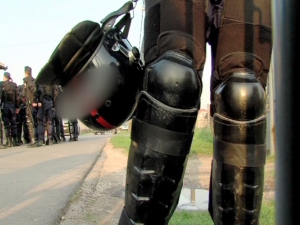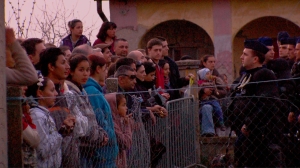by Ciuin Ferrin on Sunday, January 29, 2012
Last night The People's Church in Cedar Rapids held a wonderful candle lighting ceremony for Rromani victims of the Holocaust. I wanted to share with you some of the beauty we shared.
Reverend Tom Capo opened with a call to join us. Here is his text.
"Good evening and welcome to People's Church Unitarian Universalist. I an the Reverend Tom Capo, minister here at People's. Last week I heard about the Romani people. I held certain misconceptions and prejudices that I was not even completely aware of. Much of what I knew of the Romani people was based on movies or television shows- broad strokes about a people I really knew little about. Generalizations that painted a picture of a people who stole and cheated anyone they could and put curses on others. But as we all know, prejudices and oppressions are based on these generalizations. I did not know that the United Nations had excluded the Romani people from the annual Holocaust Memorial services. I did not know how many Romani were killed during the Holocaust. I did not know that the Romani people were being oppressed throughout Europe. I did not know that some Romani in the United States were afraid to embrace and express their Romani heritage because they would be oppressed here or their business would lose customers if they expressed their heritage. I did not know, but now I do. I am awakened to this injustice, and I feel a need to support this community and to open this church to a remembrance for this people. I have learned that there are some Romani people believe that when they die, their soul will remain alive so long as they are remembered. As we worship tonight, let us keep the souls of the Romani people who suffered during the Holocaust and who are suffering throughout the world in our thoughts and prayers. Let us remember them."This statement from Els de Groen, President of the World Artist Initiative Khetanes, was read aloud.
"Imagine a world with plenty of jobs, proper housing, health care, clean water, and proper nutrition for every human being. It would be a world without discrimination; a world where human diversity would be a source of inspiration for arts and education; a world where mankind would appreciate one another for their beauty and uniqueness as we do flora and fauna of the world. Now, take a look around our world: unemployment, homelessness, disease, and hunger. It's a world of booms and slumps, and of wealth and suffering. In this world, human variety is not perceived as richness but as a threat or potential for corruption.
Seventy years ago, Hitler's racial doctrines convinced people that once Jews and Roma were removed from existence, the Third Reich would be a paradise for the Aryan race. Approximately 6 million Jews and 1-3 million Roma perished in the darkest period in Europe's history. Though over seven decades have passed, survivors of the Holocaust must be shocked at how many of today's social attitudes parallel with those of the 1930s. Once again, in the face of many ills plaguing the world, the human race is resorting to populism, calling for scapegoats. Once more, Europe leads the way in this modern day witch hunt, and once more, the Romani people are being victimized. Fingerprinted and registered like common criminals, murdered in arson attacks, collectively deported, and defamed by the social media, the Romani people once again face the crimes they endured in the Holocaust and the situation worsens with each passing day.
Using our imagination and intellect is not a luxury only to be engaged in during times of prosperity, but more so as an absolute necessity in times of recession. We must use our ability to reason to keep racism from spreading. After all, history does not repeat itself. It is us that repeats history. We are once more allowing the senseless deaths of the Nazi victims, and only the sense to be had is in the words "Never Again". "Never Again" should these crimes be endured by the human race. Use your imagination! Imagine that we are capable of creating a world that exposes the fairy tale lies of racial superiority. This one act of mental power won't alone create the ideal, prosperous world, but it will be a far better one and the best memorial for millions murdered in the Porrajmos and the Shoah."This was the call to meditation and prayer.
"Let us join together in prayer or meditation.And Dr. Ian Hancock sent these words to be read as the votive candles, placed on the circle of our flag, were being lit.
Spirit of love, God of many names, be with us and honor the Romani people.
A human life is sacred.
It is sacred in its living and it is sacred in its dying. We grieve at the loss of so many Romani people; people who lost their lives for no other reason than the culture they were born in and that they cherished in their hearts. We also grieve for those Romani people who are oppressed; oppressed for no other reason than the culture they were born in and that they cherish in their hearts. We will remember those who have passed on, but we know in our hearts there is more that needs to be done for those alive today. We must reach out with our hands to help those in need, we must let them know that they are not alone, and there are those of us who will walk with them, who see them as people who deserve the universal human rights that all people deserve, who see them not as caricatures or as objects, or as the "Other", but as real people, with feelings of love, and hope, and sorrow, just like we have, with the same human frailties and pain that we all carry. They are no different than us, but they need us because there are some people in this world who treat them as the "Other" - to be shunned and banished and oppressed. Let is remember that nothing can take the place of outstretched hands of human sympathy and understanding, the spoken and silent assurance given by friends - let us remember we have all walked the way of sorrow, of pain, of hopelessness in times past and felt loss. Let us assure them that when they find themselves feeling sorrow or loss, pain or oppression, that they do not walk alone."
"For us in the United States, the horror of the Holocaust resonates so harshly in our memory because of the enormity of the loss of life it caused, because it occurred in the West and because it happened in living memory. Hitler's attempt to create his Master Race and to dominate all the lands around him, involved both military action and genocide. The two populations targeted for annihilation following the directive of the Final Solution were the Jews and the Roma, both people's losing between a half and three-quarters of their respective populations in Nazi-occupied Europe. We commemorate those tragic losses each year in ceremonies such as the one we are attending today. But we must also be fiercely aware that unless we continue to remember and examine such genocides, history can repeat itself. There have been other genocides since 1945. The Romani people have been subjected to the very same treatment in post Holocaust Europe that Hitler imposed upon them in his Third Reich: there have been forced arrests and incarcerations; there have been sterilizations, there have been neo-Nazi murders, all recorded in this the twenty-first century. We must be ever vigilant, ever alert to the early warning signs of another impending genocide. God bless the memories of those lost in the past, and God protect those who are being targeted in the present time."
O Porrajmos Education Society would like to thank the People's Church for their kindness and generosity in this beautiful ceremony, a ceremony the UN was unwilling to give us.





